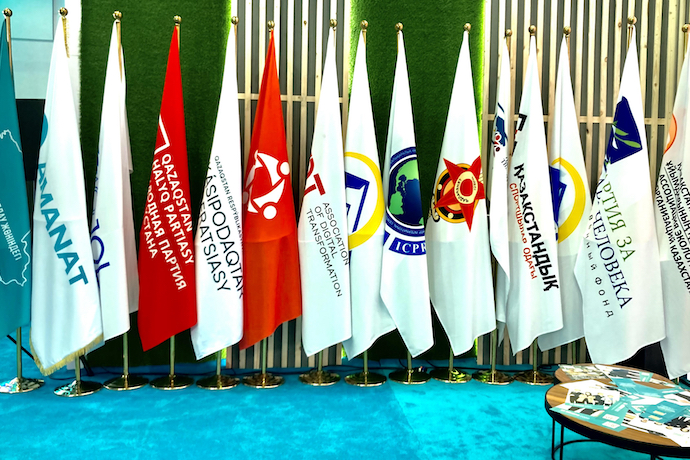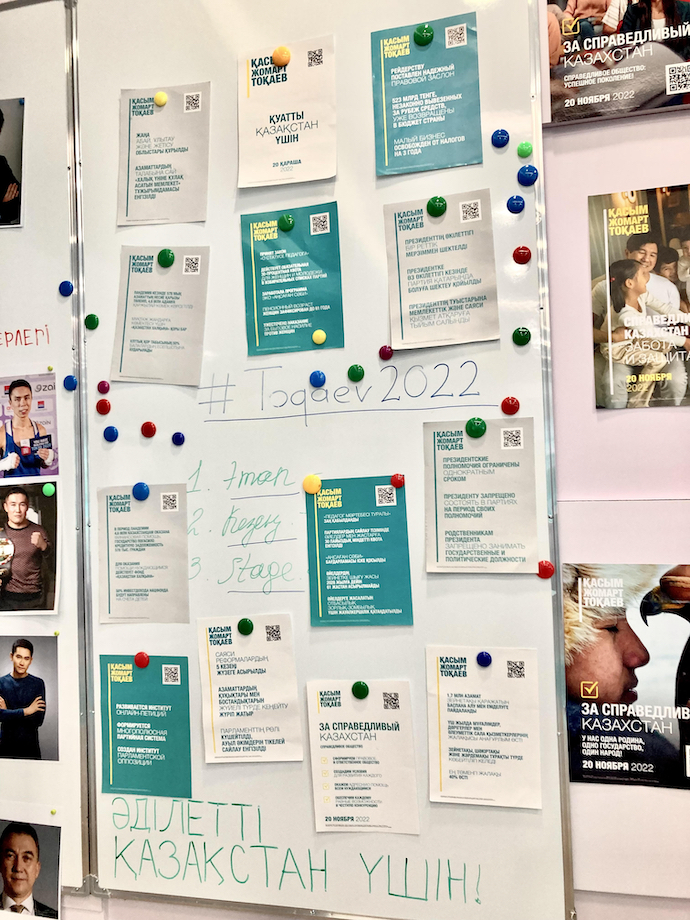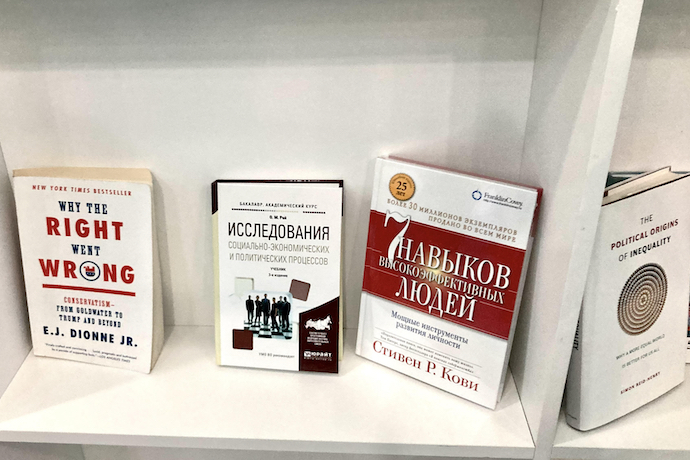The Platform
Latest Articles
by Sohail Mahmood
by Sehr Rushmeen
by Iqra Awan
by Areesha Anwer
by Abdul Mussawer Safi
by Punsara Amarasinghe
by Kanan Heydarov
by Khalid Cherkaoui Semmouni
by Rasel Hossen Shakib
by Gordon Feller
by Sohail Mahmood
by Sehr Rushmeen
by Iqra Awan
by Areesha Anwer
by Abdul Mussawer Safi
by Punsara Amarasinghe
by Kanan Heydarov
by Khalid Cherkaoui Semmouni
by Rasel Hossen Shakib
by Gordon Feller
A Lot of Amanat: Interview with Kazakhstan’s Ruling Party
Russell Whitehouse sat down with two spokeswomen for the Amanat Party to discuss the recent election in Kazakhstan.
ASTANA, Kazakhstan – The day after Kazakhstan’s election day, I sat down with two spokeswomen for the Amanat Party, Dinara Sadvakassova and Assem Sapabekova. Their party’s candidate, and incumbent president, Kassym-Jomart Tokayev, had been projected as the winner when we met at party headquarters in the capital of Astana, with Tokayev garnering over 80% of the vote.
Our conversation, conducted in person and edited for brevity and clarity, is below.
So, what do you think led to your resounding victory and success with voters?
Dinara Sadvakassova: I think such good results show that Kazakhstan’s people trust [Tokayev]. In the last three years, he’s shown his sustainable policy in different spheres. For example, in three years, we made changes in the political system. We make constitutional reforms. We have good changes in our economy and in our social policy.
So, over these past last few years, they showed our people that this president answers proxy requests, requests of our people. This election shows that because of understanding people, they trust him, and they want to be with him in the following seven years.
Assem Sapabekova: We are proud of [Tokayev].

So, what were some of the key campaign promises you made, in terms of the economy, jobs, and diplomacy?
Dinara: [Tokayev] had a big pre-election program. There were three main points [Tokayev] championed. A fair government, economy, and society. And in these three points, he suggested many, many good ideas, and many good projects. For example, this year in Kazakhstan, it’s the Year of Children. And one of his suggestions is to transfer 50% of national funds to the children’s bank accounts. Do you understand me?
Could you explain that in more detail?
Dinara: We have a National Fund, and this comes from the commodity sector.
Assem: 50% of this revenue goes to the future of our kids. So, we’ll open bank accounts for the kids. So, we will try to invest in the future of our kids, in education and social programs, etc. So now Tokayev’s thinking more about our young people and kids, about their future.
Dinara: All the primary school kids will be provided with free breakfasts and lunches.
We have a similar program in the U.S., but it’s means-tested. So, it’s only for children below a certain income.
Dinara: No, we decided this program will be provided to all school children. we decided not to divide them. It’s just one or two points of Tokayev’s program. For example, scholarships for students will be doubled in seven years. He has also some initiatives for ensuring medical services for teachers, civil servants, people with special needs, etc.
Assem: I think [Tokayev] has big plans and programs for the future. Tokayev came to this program with a big responsibility. So, he’s researched them.
So, I talked to a lot of people since I’ve come here, and one of the main points a lot of people had was access to affordable health care. So, could you go more into Tokayev’s promises in terms of health care?
Dinara: 42% of Kazakhs live in rural areas. [Tokayev] suggests building about 700 mini-centers in rural areas. We have about 210 districts inside of our oblasts. [Tokayev’s] plan is to build 32 multi-profile hospitals in district regions, for people who live in rural areas. In the last three years, after the pandemic, the salaries of our doctors doubled or tripled.

So as part of your campaign, did you focus at all on making health care more affordable?
Dinara: In Kazakhstan, the medical system is free. So, we have private clinics, we have paid medical comprehensive services, but also, we have alternatives. I know in the United States the medical system is very expensive, and it’s not free. Kazakhstan is one of the few countries where medical care is free.
No one here pays for medication or doctor’s checkups or anything. Correct?
Assem: No, there are some programs for people, you know usually plugged-in issues. So, there are big hospitals with payable checkups, so it depends. But there is a big population in Kazakhstan and it’s growing. Normally, it’s free for all the population, but there is a governmental drive to increase the quality and quantity of free medical services.
Dinara: Also, we have a medical insurance system. So, every Kazakhstani employee and employer should pay some sum to ensure this. People may get free medical services.
Also, [Tokayev] suggested building the National Center of Children’s Surgery, for children’s cancer and other life-threatening conditions. Some parents have had to resort to crowdfunding to get money from the people. And that’s why [Tokayev] thinks that we have should good medical centers here in our country so that we do not need to send our children abroad.

Would you say the Tokayev administration learned a lot of lessons from COVID?
Assem: Yes, of course, the country…every country has gained valuable experience after COVID.
Well, some countries did better than others.
Dinara: I totally agree with you. My parents are doctors, and before the pandemic, their salary was about $500, maybe. And after the pandemic, their income has doubled or almost tripled. And we saw weak points, in terms of managing the pandemic. And now we have big reforms in our medical system.
One of the main points of the Tokayev campaign is to increase the national pharmaceutical production to 50% of domestic needs. So Tokayev suggests we make drugs here in Kazakhstan, not import from other countries. We manufactured our own COVID-19 vaccines. I know of just six or seven countries that made their own vaccines. And Kazakhstan was in the six or seven countries because we have good potential to develop our pharmacy system.
You said the goal is 50% production.
Dinara: Yes, it’s a big goal, in the following seven years, to increase the production of standard drugs to 50% of domestic demand.
That leads me to my next question in terms of the global supply chain crisis, which has led to inflation, and shortages of fertilizer, and other essential goods that everyone needs to survive. What promises did Tokayev make in terms of stabilizing the price of oil, wheat, and other goods?
Dinara: It’s a very good question, of course, because it’s a worldwide economic crisis. The conflict between Russia and Ukraine also impacted our national economy. [Tokayev] also suggests some measures. For example, this year we had a special committee that monitored the price of national goods, like bread, rice, and macaroni. This committee went to bazaars and marketplaces and tried to convince vendors not to price gouge.
Assem: The government doesn’t have to regulate everything. It must regulate the economy less than before. The government doesn’t have to regulate very strongly the economy of Kazakhstan.
Dinara: But on the other side, we should increase salaries and the budgets of our families. [Tokayev] has suggested increasing the salaries of some segments of the population. On the other hand, he has suggested increasing pensions.
Would you say your focus on education had a big impact in terms of driving the youth vote?
Dinara: They voted for Tokayev. Tokayev was nominated for president by the People’s Coalition, which, in addition to the Amanat Party, includes 2 political parties and more than 30 public organizations. They voted not for our party, but they voted for a candidate’s coalition.
Assem: They have made many pitches to voters. I think young people are motivated because of this youth program.
Dinara: Tokayev spoke on issues of importance to young people. For example, he suggests the principle of “not for the youth, but with the youth.” We changed our concept of working with the youth. We made many different programs for our young generation. Youth should not just be an object of our youth policy; they should be the subject. At every meeting and event, [Tokayev] came to us to youth, not to the ministers. [Tokayev] wants to be with us, [Tokayev] wants to talk with us, and he also wants to know our opinions. And one of his first ideas is to make a presidential reserve of young people.
We have about 350 young people around Kazakhstan, and they work in different spheres of government. For example, I am, also a member of the presidential reserve program and I’m here at Amanat Party. Others are in local institutions.
Could you speak a little bit about the government’s plan to diversify the economy beyond just oil?
Dinara: We want to make our economy more independent from oil because now our economy is very dependent on oil exports. The price of oil has a strong influence on our economy and that’s why we now want to make different kinds of income sources. Not only oil, gas, and minerals.
Assem: We are a very rich country in terms of minerals. You may have heard about this.
Dinara: We are exploring other sectors. For example, tourism, medical tourism, agriculture, and production. We have large transport and logistics potential. We focus on the development of small and medium-sized businesses. We want to be more independent from the exporting of oil and gas.
What about the service sector?
Assem: We are now developing our IT sector.
Dinara: More than half our government services are available online. Any government documents you need are available on your mobile phone.
What do you think Westerners should think about Kazakhstan and its future, and its place in the world? What should we think about when we think about Kazakhstan?
Dinara: You should think that Kazakhstan is not only steppes, camels, and the former Soviet Union. Kazakhstan is a modern state with a stable political system. Our country has a clear position on all issues. We are a peacekeeping state that has voluntarily renounced nuclear weapons and embraced nuclear non-proliferation. More than 130 ethnic groups live in our country, and our model of interethnic harmony has been recognized all over the world.
We have combined the preservation of history, and traditions, while also looking toward the future. We have had a deep culture, since before the Cold War. The Kazakh Khanate of the 15th century, for example. And we have a very big potential.
Kazakhstan now plays a major role in Central Asia. In the north, we have Russia, China, and not far from here, Afghanistan. And that’s why to make this region more stable, you should suggest Kazakhstan as a partner. [Tokayev] is a respected authority on the world stage because Kazakhstan spearheaded a lot of initiatives at the United Nations. For example, the resolution of the conflict in Syria was negotiated here in Kazakhstan. 19 rounds of conflict mediation were commenced here in Astana.
We also have good initiatives for the green economy. You should think that Kazakhstan is a good strategic partner for Western countries, and we also have good opportunities for investors, including little or no taxes for investors.
We have a whole generation of independence. Our main wealth is human capital. The names of Dimash Kudaibergenov, Gennady Golovkin, and Imanbek are known the world over. Our young people work in Silicon Valley, at Google and Facebook. Our country has a bright future. And we see our partners in the face of Western countries.
Russell Whitehouse is a freelance social media manager/producer, 2016 Iowa Caucus volunteer and a policy essayist.
